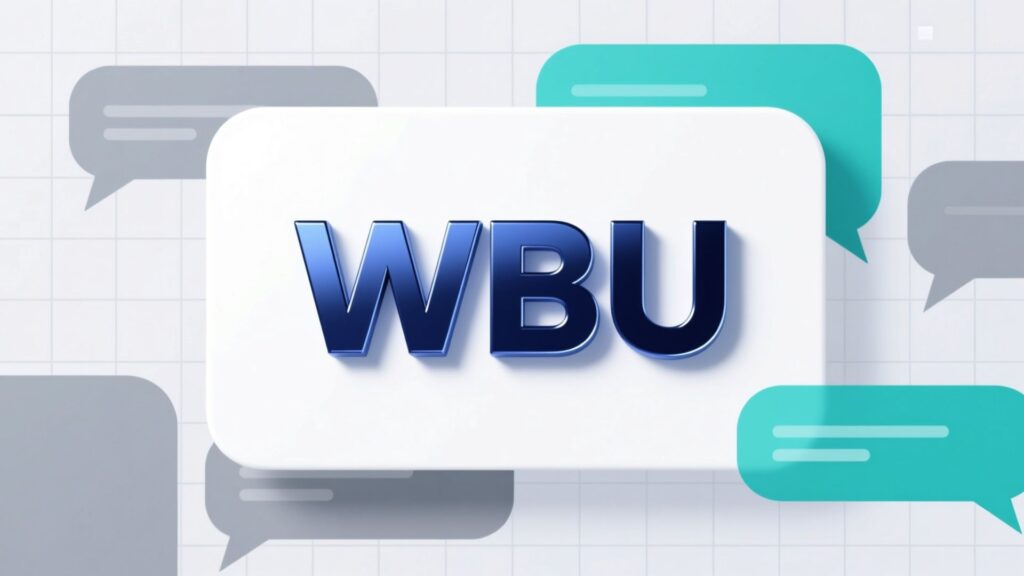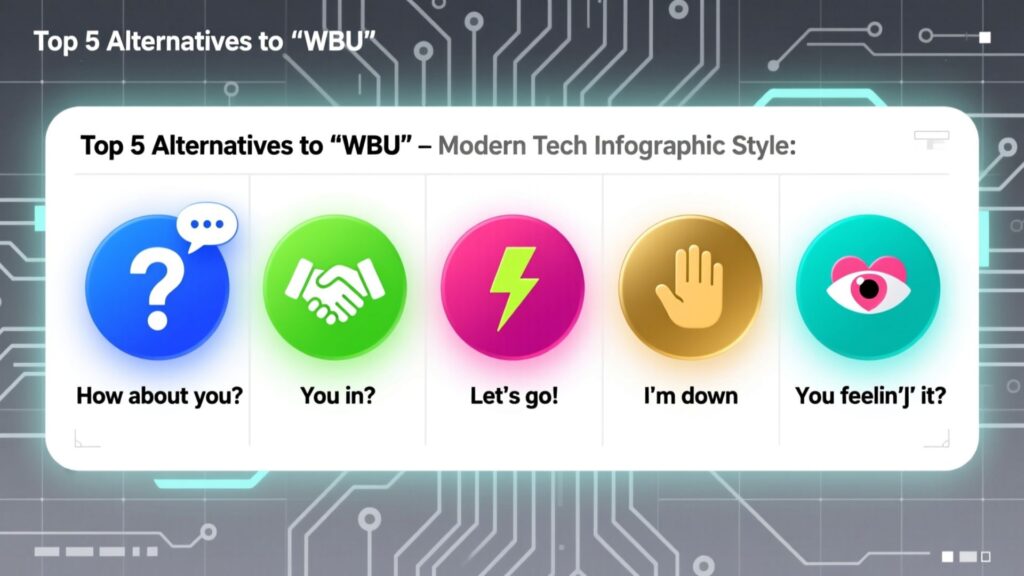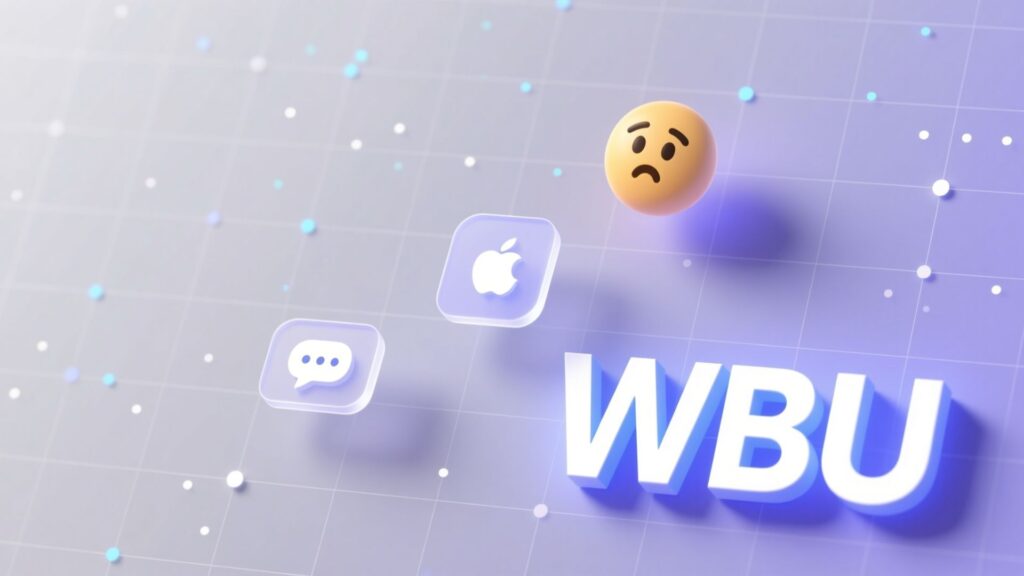WBU Meaning in Text
Unlocking the full form of “WBU” and learning how to use it like a pro
Introduction: Why “WBU” Still Matters in 2025

You’ve probably typed “WBU” in a chat, social-media comment or text message. Maybe you asked it yourself or someone asked you and you paused wondering what exactly does “WBU” mean in chat? This article helps you decode the acronym, understand the tone behind it, and learn better alternatives when you want polite, professional or friendly communication.
In today’s ever-accelerating digital conversations, shortcuts like “WBU” full form in chat become normal. But using them without thought can make tone off, especially in professional or semi-formal settings. So we’ll cover:
- The meaning of “WBU” and how it evolved
- Real-life examples of how people use it
- The tone behind “WBU”
- When you shouldn’t use “WBU”
- Polite, professional and friendly alternatives to “WBU”
- Why choosing the right alternative matters
- How to pick the best “WBU” alternative based on the situation
- Common mistakes to avoid when using “WBU” or its alternatives
By the end you’ll be able to use “WBU” (or avoid it) with clarity and confidence.
What Does “WBU” Mean in Text?
Firstly, what does “WBU” mean? The acronym stands for “What About You?”.
The full form in chat
- “WBU” → “What About You?” (short form)
- Sometimes people interpret it as “What About You?” in texting.
- It typically appears after someone shares their own status, opinion or experience, to shift the question back to the other person.
Origin and evolution
- The phrase “What About You?” has existed in spoken English for decades.
- With texting and online chat growth, people started shortening “about” to “‘bout” and “you” to “u”. So “What ’bout you?” emerged, and then the acronym “WBU”.
- It gained traction when instant messaging, mobile chats and social media required faster responses and casual tone.
- Today, “WBU meaning in chat” is widely understood across teens, young adults, and in informal digital communities.
Where it’s used
- Instant messaging (WhatsApp, Telegram, Messenger)
- Social media comments and posts
- Group chats, informal work chats
- Casual email or chat threads among colleagues who are friendly
Quick definition recap
WBU full form in chat = What About You?
WBU meaning = This abbreviation asks the other person what they think, feel or plan, after you share your side.
Real-Life Examples of “WBU” in Text Conversations
Seeing it in context helps you understand how “WBU” works. Here are some real-life style examples.
| Scenario | Example Text | Meaning/Tone |
|---|---|---|
| Friendly chat | “I’m grabbing coffee ☕ WBU?” | Casual, friendly check-in |
| Work message | “I submitted the report this morning, WBU?” | Neutral, polite inquiry |
| Online dating/chat | “I love hiking at dawn. WBU?” | Inviting response, light flirting |
| Group chat | “I’m free this weekend. WBU guys?” | Inclusive, looking for others’ status |
| Text after update | “Finished my shift early WBU?” | Checking other’s schedule |
These showcase different shades of “WBU”. Notice how punctuation (the question mark) and emoji can affect tone.
The Tone Behind “WBU” – What It Really Conveys
When you write “WBU”, you’re not just typing letters. You’re sending a tone. Let’s break down what that tone can say.
Possible tone cues
- Interest: You’re showing you care about the other person’s thoughts or status.
- Casualness: The abbreviation signals informal, relaxed conversation.
- Reciprocation: After you share something, you shift the question back as a courtesy.
- Brevity: It signals quick chat not a deep conversation necessarily.
When “WBU” might feel off
- If the chat is semi-formal or professional, “WBU” might feel too casual or lazy.
- If you use it with someone who doesn’t know the acronym, they might mis-interpret.
- If you send it with no personal context or follow-up, it might feel abrupt (“Just me? WBU?”).
Emojis and punctuation matter
- “WBU?” with a question mark invites response.
- “WBU 😊” softens the tone, adds friendliness.
- “WBU” (no punctuation) might feel abrupt.
The psychology behind short-form communication
In 2025, quick responses dominate chat. Using acronyms like “WBU” helps maintain flow. But the risk: misunderstandings. When you shorten too much, you lose nuance. That’s why understanding the tone matters.
When Not to Use “WBU”
Knowing when not to use “WBU” is just as important as knowing when to use it.
Situations to avoid “WBU”
- Formal emails or official messages: To a client, senior leader or first-time contact.
- First impressions: If you haven’t built rapport.
- Sensitive or emotional discussions: When you need full sentences, clarity and tone-care.
- Unclear contexts: If the recipient might not understand “WBU full form”.
Why avoid it then?
Using too informal an acronym when formality is expected can undermine your credibility. It may make you appear unprofessional or disengaged. If you’re unsure about your relationship or the recipient’s preference, choose a more formal alternative.
The Best Alternatives to “WBU” – Polite, Professional & Friendly Options

Instead of defaulting to “WBU”, you can choose alternatives that better match your tone. Here we categorize by setting.
Polite & Professional Alternatives
- “How about you?” Safe and neutral.
- “What are your thoughts?” Good for work discussions.
- “What’s your opinion?” Formal, invites feedback.
- “Do you feel the same way?” Diplomatic.
- “Would you like to share your view?” Courteous and inclusive.
Friendly & Casual Alternatives
- “What about you?” Slightly more relaxed than the formal version.
- “Your turn what’s up with you?” Playful, friendly.
- “Got anything going on today?” Check-in tone.
- “Care to share your thoughts?” Warm and inviting.
- “And yourself?” Short, smooth, fits quick chats.
Social Media / Group Chat Variations
- “What’s happening with you guys?”
- “Same here! You?”
- “Anyone else doing that?”
- “What’s everyone up to?”
- “Who’s in?”
Why alternatives matter
Using the right phrase signals you understand the setting and relationships. It helps you connect more effectively.
Why Using Better Alternatives Matters
You might wonder: Is choosing a slightly different phrase really that big a deal? Yes , and here’s why.
Builds stronger digital connections
When you match tone to context you show respect and empathy. That leads to better engagement.
Prevents miscommunication or tone mishaps
The wrong tone too casual, too formal can derail a conversation. A “WBU reply in chat” that feels lazy might embarrass you.
Reflects emotional intelligence
Selecting phrasing that fits shows you understand your audience. That fosters trust.
Enhances your professional image
In workplace chats or semi-formal settings, using “What are your thoughts?” over “WBU?” gives you more credibility.
How to Choose the Best “WBU” Alternative Based on Situation
Here’s a practical guide to help you pick the right wording.
| Situation | Best Alternatives | Why It Works |
|---|---|---|
| Texting a friend | What about you? / Got anything going on? | Welcoming and casual tone. |
| Replying to a coworker or client | What are your thoughts? / How about you? | Professional but still friendly. |
| Chatting in a group chat | What’s everyone up to? / Who’s in? | Inclusive and engaging. |
| Semi-formal email | Do you feel the same way? / Would you like to share your view? | Respectful, invites deeper input. |
Example case:
You just shared your weekend plans in a group chat. Instead of “WBU?”, you write:
“I’ll hit the trails Saturday. What about you guys doing anything fun?”
That extra word “guys” and full phrase make it feel warmer and more inclusive.
Common Mistakes to Avoid When Using “WBU” or Alternatives
Even small missteps can affect how your message lands. Here are frequent errors and how to fix them.
Mistakes
- Using “WBU” in a formal setting where full phrasing is better.
- Sending “WBU?” as a stand-alone message without context.
- Mixing very informal chat slang with serious topics.
- Using too many acronyms in professional chat.
- Forgetting punctuation or proper tone when using an alternative.
Quick fixes
- If unsure about formality, avoid “WBU” and use “How about you?”
- Always follow up your own statement with the question: “I’m busy this week with project X. How about you?”
- For sensitive discussions, write full sentences: “I’d like to know your view. What do you think?”
- In group chats, personalise: “Thanks for the update what’s happening on your side?”
Expert Tips to Make Your Digital Conversations Sound Natural
Want to sound more like a thoughtful human and less like an autopilot? Here are tips to elevate your chat game.
- Match the platform: Slack or Teams chat may tolerate more abbreviation than formal email.
- Mirror the other person’s style: If they write full sentences, respond in kind.
- Use emojis moderately: A 😊 or 👍 can soften a quick phrase.
- Balance brevity with warmth: Short messages fine, but add a friendly phrase occasionally.
- Proofread in professional chats: Quick scan for tone, clarity and politeness.
- Watch your audience: With clients or older colleagues you might skip slang entirely.
- Trigger deeper responses: Instead of “WBU?”, you could say “I’d love your take on this. How about you?”
Quick Comparison Table: “WBU” vs. Its Alternatives
Here’s a handy table summarising when to use “WBU” and when to pick alternatives.
| Expression | Tone | Use Case | Best For |
|---|---|---|---|
| WBU | Very casual | Quick chat with peers/friends | Short informal replies |
| How about you? | Neutral | Quietly professional/casual | Broad settings |
| What are your thoughts? | Polite-professional | Work discussions, feedback | Input and opinions |
| Would you like to share your view? | Courteous & formal | Formal meetings or emails | Respectful tone |
| And yourself? | Warm short | Friendly check-in | Social chats |
Wrap-Up: Speak Smarter, Connect Better in 2025
In digital communication, phrases like “WBU meaning in chat” matter more than you might think. While “WBU” gives a quick and efficient way to ask What about you?, it doesn’t always fit every context. By understanding when to use it and when to switch to a wbu reply in chat that’s more tailored you’ll connect with others smarter and smoother.
Use friendly alternatives when chatting with friends, polite ones in semi-formal spaces, and professional ones in work or formal settings. This approach keeps your tone on point and your message effective.
Final takeaway:
- Know the wbu full form in chat = “What About You?”
- Use it when the setting is casual and everyone’s comfortable with shorthand.
- Choose alternatives when tone, clarity or professionalism matters.
- And always read the room: match your phrasing to your audience.
Next time you see “WBU?” in your messages, you’ll know exactly what it means and you’ll know how to respond with style.
FAQs
Q: Is “WBU” rude or informal?
A: Yes, it’s informal in many settings. In casual chats it’s fine. In formal or professional ones it may feel too relaxed.
Q: Can I use “WBU” in work emails?
A: Usually not. Better to use “What are your thoughts?” or “How about you?” when writing in a professional context.
Q: Does “WBU” always need a response?
A: Yes , it’s a direct question. It implies you expect the other person to share something.
Q: Are there variations of “WBU”?
A: Yes , “HBU” (How About You?) is common. Also “And you?” or “What about you?” are full-phrase alternatives.
Q: Is “WBU meaning” different for different generations?
A: Slightly. Younger users may use it freely in chats and social posts. Older users or professional contexts may not recognise it or prefer full phrases.
If you’d like even more examples (including real chat transcripts) or a downloadable cheat sheet of “WBU” alternatives, I can pull that together. Would you like that?
Bugti is the founder of Quoethint.com, a hub for English language tips, writing advice, and grammar guidance. With years of experience in English studies and a passion for clear communication, Bugti created this platform to make grammar and writing easy to understand for everyone.
